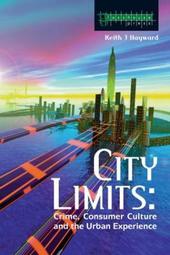
|
City Limits: Crime Consumer Culture and the Urban Experience
Paperback
Main Details
| Title |
City Limits: Crime Consumer Culture and the Urban Experience
|
| Authors and Contributors |
By (author) Keith J. Hayward
|
| Series | Criminology S. |
|---|
| Physical Properties |
| Format:Paperback | | Pages:270 | | Dimensions(mm): Height 234,Width 156 |
|
| ISBN/Barcode |
9781904385035
|
| Classifications | Dewey:364.25 |
|---|
| Audience | | Tertiary Education (US: College) | | Professional & Vocational | |
|---|
| Illustrations |
1, black & white illustrations
|
|
Publishing Details |
| Publisher |
Taylor & Francis Ltd
|
| Imprint |
Routledge Cavendish
|
| Publication Date |
8 May 2004 |
| Publication Country |
United Kingdom
|
Description
Criminology has always enjoyed a highly productive relationship with the city, generating many important empirical and theoretical studies. But all too often the human experience, social diversity and the inherently pluralistic fabric of city life are transformed into the discourse of demographics, statistics and rationality. This book examines the crime-city nexus in a way that makes sense of criminology's past and contemporary engagements including both administrative criminology and the work of Jack Katz and Mike Davis. Drawing on a range of disciplinary frameworks - social theory, urban studies, architectural theory and research into urban consumerism practices - the author argues that consumption is central to understanding the city and urban crime. This book will be of interest to students and academics of criminology, social theory, urban studies and cultural studies.
Author Biography
Keith J Hayward is a Lecturer in the School of Social Policy, Sociology and Social Research, University of Kent at Canterbury.
Reviews'City Limits contributes to a growing body of work under the umbrella of 'cultural criminology', which attempts to bring an appreciation of cultural change to an understanding of crime in late modernity (Hayward and Young 2004). Hayward presents an ambitious theoretical analysis that attempts to inspire a 'cultural approach' to understand the 'crime-city nexus' and, in particular, to re-address 'strain' and the concept of 'relative deprivation' in the context of culture of consumption/ He incorporates an impressive array of literature from beyond the boundaries of traditional criminology - including urban studies, social theory and, most strikingly, from art and architectural criticism - illustrating a multidisciplinary approach, This provides for a challenging and enlightening read, with particularly important emphasis on the impact of consumer culture on the lived urban experience and spatial dynamics of the city and, in turn, for an understanding of transgression and criminality...Hayward's emphasis on the implications of a culture of consumption on theories of crimes is extremely thought-provoking and the book is littered with observations on consumption that raise important questions for criminology. There are, or course, areas of 'offending' for which this book has less clear relevance, but as a means for raising questions about the significance of consumer culture for understanding the 'expressive' aspects of crime, and perhaps more so for understanding crimes of consumption this emphasis on consumer culture is extremely valuable.' British Journal of Criminology, Vol. 45: No. 3 (May 2005), Jacqui Karn, LSE 'City Limits is a book I believe many will benefit from reading, including students of criminology and urban studies as well as practitioners and researchers who should find Hayward's interdisciplinary approach both welcoming and a challenge. It is a very readable volumeThe main intention of this book is to promote dialogue between subjects that will benefit from appreciating alternative approaches to conceptualising and analysing crime. On this basis alone, it deserves recommendation.' Environment and Planning C: Government and Policy 2005 , volume 23, pages 311-316 'A broad and richly suggestive text, one that promises to restructure discussions of urban crime. Such wide-angle views are rare in criminological inquiry, and much appreciated when accomplished with the skill of analysts like Hayward.' Environment and Planning A, 2005, issue 37/1, November 2005. Steve Herbert, Department of Geography/Law, Societies and Justice Program, University of Washington. 'Hayward's intense, multi-disciplinary approach continues through the book's five chapters, although each chapter is neatly bounded in its focus to allow the breadth of ideas to be addresses incrementally. The style is rich and engaging, with Hayward's cultural references offering a grounding in reality and a connection with personal themes in all of our lives...Hayward is successful in drawing all of these complex debates together, and in doing so offers a breadth and depth of analysis that should offer something to each of the various disciplinary audiences with whom he aims to connect.' The British Journal of Sociology, September 2005. Alison Wakefield, City Universiity, 'At a time when orthodox criminology has become more and more arid and uninteresting, distancing itself from the reality of crime by a wall of verbiage scrawled over with statistical graffiti, cultural criminology has emerged as a beacon of clarity and excitement. Keith Hayward's book City Limits breaks the boundaries: it is cross-disciplinary, cutting across sociology, urban studies and philosophy; it roots crime in the new rhythms of consumerism and the marketplace; it is infused with the bustle of the city and the strategies of identity and survival. Above all it is a fascinating and riveting read. Do yourself a favour: read it.' Jock Young, Distinguished Professor of Sociology, John Jay College of Criminal Justice, City University of New York.
|